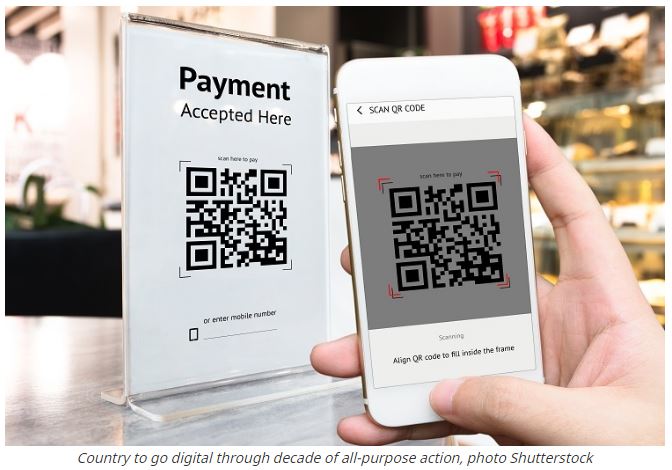Vietnam to go digital through decade of all-purpose action
Vietnam has made a new policy move in its journey to transform itself into a digital economy and improve its legal framework, much to the appreciation of investors and businesses.
Over a week ago, the Politburo enacted Conclusion No.77-KL/TW on overcoming impacts of COVID-19 for national economic recovery and development. The conclusion underlined the need for Vietnam to develop a digital government, economy, and society with renovations and applications of science and technology.
“Resources are gathered to develop a number of shared technological platforms and national key database systems,” reads the conclusion. “It is necessary to boost the formulation of policy frameworks and complete these for new business models and for digital transformation.”
Meanwhile, Prime Minister Nguyen Xuan Phuc last week approved a national programme on digital transformation until 2025, with a vision to 2030.
Together with the Politburo’s hallmark Resolution No.52-NQ/TW released last September on a number of guidelines and policies to actively participate in the Fourth Industrial Revolution, and Conclusion 77, this programme is a big addition to Vietnam’s effort to showcase its strong determination to become a digital economy, in which new products, services, solutions, and business models are accepted in tandem with the country’s gradual completion of legal frameworks.
“The government will create new policies to stand ready to accept and pilot new technological solutions controllably. There must be a culture of accepting and piloting new things,” stated PM Phuc. “Vietnam’s technological businesses are the key developers of infrastructure, platforms, services, and solutions of the digital transformation. They will have to master core technology and then expand their presence to the global markets.”
Vietnamese enterprises are to be facilitated to co-operate with global technological giants to research, develop, transfer, and apply new technologies and models in Vietnam.
In its digital economy development programme, the government will aim to develop four types of digital businesses, namely major trade and service groups focusing on digital technology investment and core technologies, IT firms focusing on research and development (R&D) and production, and digital startups that create innovative products.
Notably, Vietnam plans to shift from assembly and processing towards creating ‘Make in Vietnam’ products, meaning creating, designing, and producing products in Vietnam. Moreover, the country will “research, develop, and master all technologies, and produce digital equipment such as smartphones, smart TVs, tablets, and Internet-of-Things equipment, while meeting all technical standards on ensuring cybersecurity.”
Jeff Paine, managing director of the Asia Internet Coalition (AIC), told VIR that Vietnam is full of potential to become a digital economy. In recent years, the country has taken steps to attract overseas Vietnamese to come back home. This has enabled a burgeoning entrepreneurial scene, where startups and small businesses that leverage technologies have emerged.
“With the ongoing trade tensions between the US and China, Vietnam also is well poised to meet the demand of companies shifting their production capacity out of China into Southeast Asian economies like Vietnam,” Paine said. “The opportunities from these developments are enormous, as the availability of local tech talents in a country with almost 100 million people will create a foundation upon which global tech companies can invest and develop innovative products and services for both local and regional markets. Grab, which opened an R&D centre in Ho Chi Minh City in 2017, is an example.”
According to Dang Hoang Hai, general director of the Ministry of Industry and Trade’s Department of E-commerce and Digital Economy, currently in Vietnam, one of the firm foundations for developing a digital economy is the boom of e-commerce.
“Success in e-commerce development will also help Vietnam soon reach its goals and successfully develop its own digital economy,” Hai said.
He estimated that currently there are about 24,250 websites with e-commerce applications in Vietnam, 143.3 million mobile phone subscribers, and 62 million social network users and internet users.
“All these stats show great potential for Vietnam to develop its e-commerce industry, which is now considered the biggest highlight in Vietnam’s drive to develop its digital economy,” Hai said.
Vietnam’s open policies have enabled it to attract leading global technology companies who have chosen the country as a place to build major manufacturing facilities that supply equipment and products to the world, creating more jobs and developing human capital.
“Today, we are seeing a shift higher up the technology value chain, to software development and digital application-based services. These foreign investments are critical to Vietnam, especially for transfer of knowledge and international best practices, which will support the development of a local ICT industry that is globally competitive,” Paine said.
According to financial and accounting consultancy firm Deloitte, amidst the proliferation of physical channels, digital platforms are also emerging in the retail market, which is part of a digital economy, with players such as Adayroi, Lazada, Shopee, and Tiki leading the pack. The growth potential of Vietnam’s digital retail market has also captured the attention of several e-commerce giants, with Amazon launching an initiative together with the Vietnam e-Commerce Association to provide digital services to a group of 140 local businesses.
| Targets for Vietnam’s digital economy over the next decade
Basic targets until 2025 – Vietnam will be among the 70 nations taking the lead in e-government in the United Nations Department of Economic and Social Affairs’ E-Government Development Index (EGDI); – The digital economy will account for 20 per cent of GDP; – The ratio of the digital economy in each industry will reach at least 10 per cent; – Annual labour productivity will increase at least 7 per cent; – Vietnam will be among the 50 nations taking the lead in global competition; – Vietnam will be among the 35 nations taking the lead in innovation. Basic targets until 2030 – Vietnam will be among the 50 nations taking the lead in e-government in EGDI; – The digital economy will account for 30 per cent of GDP; – The ratio of the digital economy in each industry will reach at least 20 per cent; – Annual labour productivity will increase at least 8 per cent; – Vietnam will be among the 30 nations taking the lead in global competition; – Vietnam will be among the 30 nations taking the lead in innovation. Source: National programme on digital transformation until 2025, with a vision to 2030 |
In another case, founded in 2010 as a web-based book retail business, Tiki has since then expanded its offerings to a wider range of products, including home appliances, electronics products, and healthcare products. In March 2017, Tiki announced that it would be transforming its business model from a business-to-customer platform to a business-to-business-to-consumer platform. This strategic shift appeared to be well-received by investors, following a $50 million investment from JD.com at the end of 2017 and another $10 million from STIC Investments in early 2018.
“Vietnam has become an attractive spot for e-commerce development, with many types of firms,” said Tran Hai Linh, CEO of Sendo Technology, which has over 10,000 buyers nationwide. “E-commerce development is laying a firm groundwork for Vietnam to successfully develop its digital economy.”
According to the Vietnamese Ministry of Planning and Investment, one of the key factors for the successful construction of a digital economy and the successful implementation of Industry 4.0 is that the government will issue special incentives for foreign firms to establish R&D centres in Vietnam.
Currently, many foreign businesses are already operating R&D centres in the country, such as Singapore’s Grab, South Korea’s Samsung, Sweden’s ABB, and Germany’s Bosch. The US telecommunications giant Qualcomm is also considering founding such a centre in Vietnam.
Ousmane Dione – Country director for Vietnam World Bank
I would like to offer three actionable measures, one to the business community and two to the government, as ways forward for deepening the ongoing digital government reforms. My proposed action for the business community is to step up digitalisation as COVID-19 has been a wake-up call for business leaders. The business continuity today seems impossible without the right technology in place, with online businesses experiencing less severe disruption than offline as seen during the crisis. A study performed in Singapore in 2019 shows that the use of digital technologies can increase small- and medium-sized enterprises’ (SMEs) value and productivity by 26 and 17 per cent, respectively. It is estimated that the digitalisation of SMEs in the ASEAN region could add $1.1 trillion of GDP value across the region by 2025. Vietnamese business leaders can certainly start their digitalisation process to ensure the future of the business community by using the services available in the National eService Portal. Furthermore, there are two proposals for the government. Firstly, e-services begin with the simplification of business processes. Regardless of how many services are available online, if those services do not reduce time investment and transaction costs for businesses, these services will mean little to them. Thus, it is important for the government to optimise business processes. Data which has been generated and collected via the government’s eService Portal will serve as a great starting point to analyse where the bottlenecks are and which steps could be removed from existing processes. Other data sets such as registrations, licensing, permits, and payments will also be useful pointers. Second, the government can serve as a launching platform for the private sector’s digitalisation. Many governments have encouraged and enabled their businesses to digitally transform by creating partnerships with technology providers, even well before the pandemic. These include the SMEs Go Digital Programme of Singapore in 2017, Digital China 2020, and Australia’s Small Business Digital Champions, to name a few. These various government-led initiatives have supported firms in the respective countries to adopt new business models, such as e-commerce and digital products, resulting in significant increases in productivity and profitability. VIR |
https://vietnamnet.vn/en/feature/country-to-go-digital-through-decade-of-all-purpose-action-651132.html


 Thailand
Thailand





